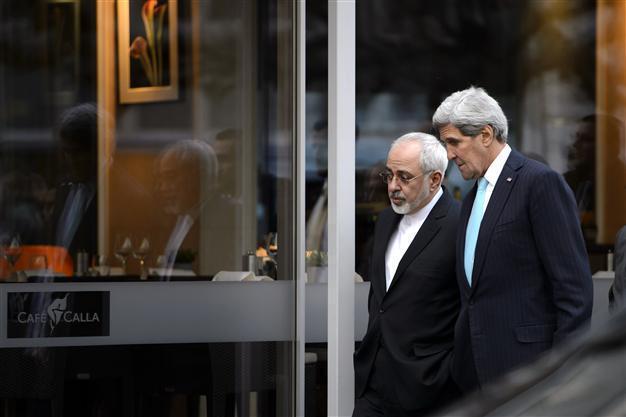US, Iran see progress in nuclear talks, but ways to go
GENEVA - Agence France-Presse

AP Photo
The United States and Iran said Feb. 23 they had made progress in the latest round of talks on Tehran's nuclear programme, but warned there was still a long way to go to seal a final deal.Negotiators for Iran and six world powers had been meeting in Geneva since Friday, and plan further talks in Switzerland next week, a senior US administration official said.
"These were serious, useful and constructive discussions," the official said after US Secretary of State John Kerry and Iranian Foreign Minister Mohammad Javad Zarif wrapped up two days of meetings in the lakeside city.
Zarif agreed. "Some progress was made on certain subjects, but there is still a long road ahead to reach a final agreement," Iranian media quoted him as saying.
As a March 31 deadline looms for reaching a political framework for a deal, State Department spokeswoman Jen Psaki told reporters in Washington that Kerry "could certainly participate at some point" in next week's negotiations, but she had nothing concrete to announce.
"These talks have been productive, there's still more work to do," Psaki insisted.
The so-called P5+1 group of Britain, China, France, Russia, the United States and Germany are trying to strike an accord that would prevent Tehran from developing a nuclear bomb.
In return, the West would ease punishing sanctions imposed on Tehran over its nuclear programme, which Iran insists is purely civilian in nature.
Tortuous nuclear negotiations have poisoned relations between Iran and the West for years. However, there is now a heightened sense of urgency ahead of the March 31 deadline, with a second June 30 date by which to agree all the technical details of a final comprehensive accord.
"We all feel the pressure, no doubt about it, but that doesn't mean that it will make us rush to an agreement that does not fulfil the (US) objectives," the senior US official said in Geneva.
The goal was to "ensure that Iran does not acquire a nuclear weapon. That objective has to be met."
Tehran has voiced unhappiness with the separation of the political and technical aspects.
"We won't have a two-stage deal," said deputy foreign minister Abbas Araghchi, who is scheduled to meet Yukiya Amano, the head of the International Atomic Energy Agency, in Vienna Tuesday.
Zarif is scheduled to address the UN Human Rights Council in Geneva next Monday, fueling speculation he might combine the trip with further talks with Kerry.
In a sign of the growing push for an accord, US Energy Secretary Ernest Moniz took part in the talks for the first time, as did Ali Akbar Salehi, the director of the Iranian Atomic Energy Organisation.
Observers suggested their participation could be a sign a deal is within reach.
"It was necessary and appropriate to have technical people sit with Iran's technical people at the highest level in order to try to resolve any differences that may exist," Psaki said, adding it had not yet been determined if Moniz would return to Geneva next week.
Ahead of the talks, Kerry had warned "significant gaps" remained, and that after two previously missed deadlines, US President Barack Obama had "no inclination whatsoever to extend these talks beyond the period that has been set out."
White House spokesman Josh Earnest Monday also repeated assertions that the chances of a deal were "50-50 at best."
"Both sides are trying to reduce expectations, but there are also signs that usually only come towards the end of negotiations," said Trita Parsi, president of the National Iranian American Council.
"You usually don't threaten to walk away from the talks, as Kerry has, until the last phases of a negotiation, for insurance. Paradoxically, it could be a sign that they're very close," Parsi told AFP.
A key stumbling block in any final deal is thought to be the amount of uranium Iran would be allowed to enrich, and the number and type of centrifuges Tehran can retain.
Meanwhile, a 2012 claim by Israeli Prime Minister Benjamin Netanyahu that Iran was a year away from making a nuclear bomb was contradicted by his own secret services, according to leaked documents quoted Monday.
Just weeks after Netanyahu's dramatic speech to the UN, Mossad shared a report with South African intelligence which concluded Iran was "not performing the activity necessary to produce weapons," according to the British daily, the Guardian.
















